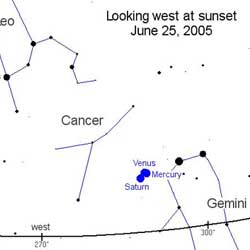
Sky map of the June 25th planetary alignment. Image credit: NASA. Click to enlarge.
Saturn, which has been prominent, in the constellation Gemini all winter is slowly exiting our skies. But the Ringed Planet has one last show to put on for us, and the stage has been set. On June 18th, Saturn was joined by Venus, followed by Mercury on the 19th. On these dates the trio formed a long string stretching from the stars Castor and Pollux to just above the horizon. As the week progressed, the two faster planets slowly drew closer to Saturn. On the evenings of the 24th and 25th the trio will form a very close conjunction with Venus being just 1 degree from Saturn and less than 1 degree from Mercury.
For the next few nights all 3 planets should be visible in the wide field of view of a pair of binoculars or small telescope. By the 27th, Mercury and Venus will have drawn away from Saturn somewhat but will lie just 8 arc-minutes from one another, nearly indistinguishable to the unaided eye.
As June turns to July, Saturn will be lost in the glare of the setting sun. But Mercury and Venus will stay in close conjunction well into the month. On July 8th look for a very slim waxing crescent moon hovering just above the pair. Around July 15th the apparent separation of Mercury and Venus will have increased to 5 degrees. At this point Mercury will begin looping back toward the sun, while Venus continues to climb higher in our evening skies.
Contrary to popular belief, planetary conjunctions are fairly common. All the planets and the sun appear to travel along an imaginary line in the sky known as the ecliptic. Because our solar system is essentially a disk, the objects in our solar system appear to follow the same path year after year after year. Since we see these objects from Earth, which is itself moving, the planets occasionally appear to get close together in the sky. Conjunctions of 2 or 3 planets happen quite often particularly when one of them is Venus. The faster planets seem to ?catch up with? and ?pass? the slower moving ones, as we see in June.
Throughout recorded history humans have observed planetary conjunctions. In ancient times they were thought to be signs or omens. Not until recent centuries have we been able to model and therefore marvel at the workings of our solar system. Even though the conjunction of Mercury, Venus and Saturn doesn?t portend events, it is nonetheless a spectacular sight to behold.
Written by Rod Kennedy
